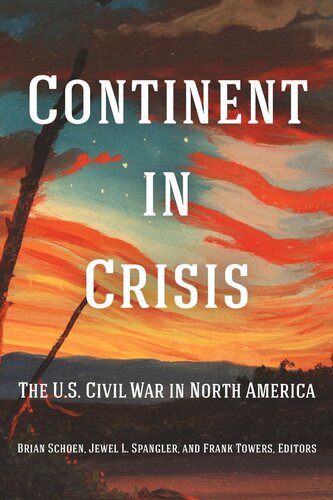

Most ebook files are in PDF format, so you can easily read them using various software such as Foxit Reader or directly on the Google Chrome browser.
Some ebook files are released by publishers in other formats such as .awz, .mobi, .epub, .fb2, etc. You may need to install specific software to read these formats on mobile/PC, such as Calibre.
Please read the tutorial at this link: https://ebookbell.com/faq
We offer FREE conversion to the popular formats you request; however, this may take some time. Therefore, right after payment, please email us, and we will try to provide the service as quickly as possible.
For some exceptional file formats or broken links (if any), please refrain from opening any disputes. Instead, email us first, and we will try to assist within a maximum of 6 hours.
EbookBell Team

4.8
104 reviewsWritten by leading historians of the mid–nineteenth century United States, this book focuses on the continental dimensions of the U.S. Civil War. It joins a growing body of scholarship that seeks to understand the place of America’s mid-nineteenth-century crisis in the broader sweep of world history. However, unlike other studies that have pursued the Civil War’s connections with Europe and the Caribbean, this volume focuses on North America, particularly Mexico, British Canada, and sovereign indigenous states in the West.
As the United States went through its Civil War and Reconstruction, Mexico endured its own civil war and then waged a four-year campaign to expel a French-imposed monarch. Meanwhile, Britain’s North American colonies were in complex and contested negotiations that culminated in confederation in 1867. In the West, indigenous nations faced an onslaught of settlers and soldiers seeking to conquer their lands for the United States. Yet despite this synchronicity, mainstream histories of the Civil War mostly ignore its connections to the political upheaval occurring elsewhere in North America.
By reading North America into the history of the Civil War, this volume shows how battles over sovereignty in neighboring states became enmeshed with the fratricidal conflict in the United States. Its contributors explore these entangled histories in studies ranging from African Americans fleeing U.S. slavery by emigrating to Mexico to Confederate privateers finding allies in Halifax, Nova Scotia. This continental perspective highlights the uncertainty of the period when the fate of old nations and possibilities for new ones were truly up for grabs.
Brings to light the interconnected history of state making and interstate violence in mid-nineteenth century North America.